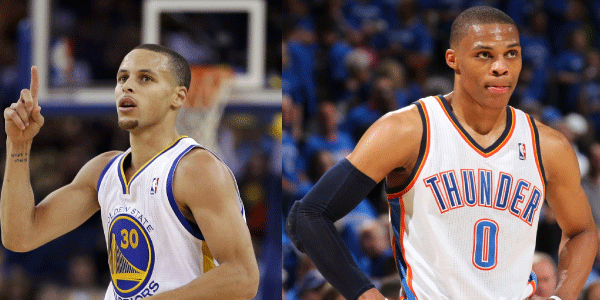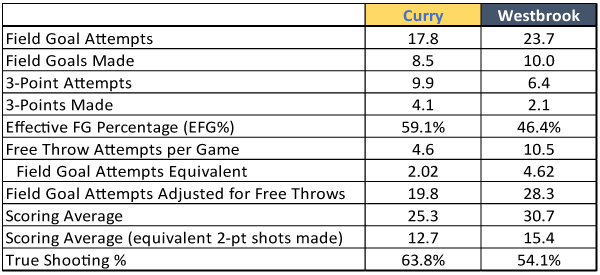
Much has been written about the fact that Russell Westbrook was not chosen for the first team on the Western All-Stars. The implication appears to be that he was more deserving than Curry. I believe that Westbrook is one of the greatest athletes to play the game and one of the better players currently in the league. Yet, I also feel strongly that so much weight is being placed on his triple doubles that he is being unfairly anointed as the more deserving player. This post takes a deeper dive into the available data and, I believe, shows that Curry has a greater impact on winning games and is deserving of the first team honor. So, as is my want to analyze everything, I spent some time dissecting the comparison between the two. It is tricky comparing the greatest shooter to ever play the game to one of the greatest athletes to ever play, but I’ll attempt it, statistic by statistic.
Rebounding
Westbrook is probably the best rebounding guard of all time (with Oscar Robertson and Magic Johnson close behind). This season he is averaging 10.4 rebounds per game while Curry is at 4.3. There is no question that Westbrook wins hands down in this comparison with Curry, who is a reasonably good rebounding point guard. But on rebounds per 36 minutes played this season, Westbrook’s stats are even better than Oscar’s in his best year. In that year, Robertson averaged 12.5 rebounds playing over 44 minutes a game which equates to 10.2 per 36 minutes vs Westbrook’s 10.8 per 36 minutes (Magic never averaged 10 rebounds per game for a season).
Assists
You may be surprised when I say that Curry is a better assist producer than Westbrook this season. How can this be when Westbrook averages 10.3 assists per game and Curry only 6.2? Since Oklahoma City plays a very different style of offense than the Warriors, Westbrook has the ball in his hands a much larger percentage of the time. They both usually bring the ball up the court but once over half court, the difference is striking. Curry tends to pass it off a high proportion of the time while Westbrook holds onto it far longer. Because of the way Curry plays, he leads the league in secondary assists (passes that set up another player to make an assist) at 2.3 per game while Westbrook is 35th in the league at 1.1 per game. The longer one holds the ball the more likely they will shoot it, commit a turnover or have an assist and the less likely they will get a secondary assist. The reason is that if they keep the ball until the 24 second clock has nearly run out before passing, the person they pass it to needs to shoot (even if the shot is a poor one) rather than try to set up someone else who has an easier shot. For example, if a player always had the ball for the first 20 seconds of the 24 second clock, they would likely have all assists for the team while on the court.
Table 1: Assist Statistic Comparison

When in the game, Westbrook holds the ball about 50% of the time his team is on offense, he gets a large proportion of the team’s assists. But that style of play also means that the team winds up with fewer assists in total. In fact, while the Warriors rank #1 in assists as a team by a huge margin at 31.1 per game (Houston is second at 25.6), Oklahoma City is 20th in the league at 21.2 per game. If you agree that the opportunity to get an assist increases with the number of minutes the ball is in the player’s possession, then an interesting statistic is the number of assists per minute that a player possesses the ball (see Table 1). If we compare the two players from that perspective, we see that Curry has 1.27 assists per minute and Westbrook 1.17. Curry also has 0.47 secondary assists per minute while Westbrook only 0.13. This brings the total primary and secondary assist comparison to 1.74 per minute of possession for Curry and 1.30 for Westbrook, a fairly substantial difference. It also helps understand why the Warriors average so many more assists per game than Oklahoma City and get many more easy baskets. This leads to them having the highest field goal percentage in the league, 50.1%.
Shooting
Russell Westbrook leads the league in scoring, yet his scoring is less valuable to his team than Stephen Curry’s is to the Warriors. This sounds counterintuitive but it is related to the shooting efficiency of the player: Curry is extremely efficient and Westbrook is inefficient as a shooter. To help understand the significance of this I’ll use an extreme example. Suppose the worst shooter on a team took every one of a team’s 80 shots in a game and made 30% of them including two 3-point shots. He would score 24 baskets and lead the league in scoring by a mile at over 50 points per game (assuming he also got a few foul shots). However, his team would only average 50 or so points per game and likely would lose every one of them. If, instead, he took 20 of the 80 shots and players who were 50% shooters had the opportunity to take the other 60, the team’s field goals would increase from 24 to 36. Westbrook’s case is not the extreme of our example but none-the-less Westbrook has the lowest efficiency of the 7 people on his team who play the most minutes. So, I believe his team overall would score more points if other players had more shooting opportunities. Let’s look at the numbers.
Table 2: Shot Statistic Comparison

Westbrook’s shooting percentage of 42.0% is lower than the worst shooting team in the league, Memphis at 43.2%, and, as mentioned is the lowest of the 7 people on his team that play the most minutes. Curry has a 5.5% higher percentage than Westbrook. But the difference in their effectiveness is even greater as Curry makes far more three point shots. Effective shooting percentage adjusts for 3 point shots made by considering them equal to 1½ two point shots. Curry’s effective shooting percentage is 59.1% and Westbrook’s is 46.4%, an extraordinary difference. However, Westbrook gets to the foul line more often and “true shooting percent” takes that into account by assuming about 2.3 foul shots have replaced one field goal attempt (2.3 is used rather than 2.0 to account for 3 point plays and being fouled on a 3-point shot). Using the “true shooting percentage” brings Westbrook’s efficiency slightly closer to Curry’s, but it is still nearly 10% below Curry (see table 2). What this means is very simple – if Curry took as many shots as Westbrook he would score far more. In fact, at his efficiency level he would average 36.1 points per game versus Westbrook’s 30.7. While it is difficult to prove this, I believe if Westbrook reduced his number of shots Oklahoma City would score more points, as other players on his team, with a higher shooting percentage, would have the opportunity to shoot more. And he might be able to boost his efficiency as a shooter by eliminating some ill-advised shots.
Turnovers vs Steals
This comparison determines how many net possessions a player loses for his team by committing more turnovers than he has steals. Stephen Curry averages 2.9 turnovers and 1.7 steals per game, resulting in a net loss of 1.2 possessions per game. Russell Westbrook commits about 5.5 turnovers per game and has an average of 1.6 steals, resulting in a net loss of 3.9 possessions per game, over 3 times the amount for Curry.
Plus/Minus
In many ways, this statistic is the most important one as it measures how much more a player’s team scores than its opponents when that player is on the floor. However, the number is impacted by who else is on your team so the quality of your teammates clearly will contribute. Nonetheless, the total impact Curry has on a game through high effective shooting percent and assists/minute with the ball is certainly reflected in the average point differential for his team when he is on the floor. Curry leads the league in plus/minus for the season as his team averages 14.5 more points than its opponents per 36 minutes he plays. Westbrook’s total for the season is 41st in the league and his team averages +3.4 points per 36 minutes.
Summing Up
While Russell Westbrook is certainly a worthy all-star, I believe that Stephen Curry deserves having been voted a starter (as does James Harden but I don’t think Harden’s selection has been questioned). Westbrook stands out as a great rebounding guard, but other aspects of his amazing triple double run are less remarkable when compared to Curry. Curry is a far more efficient scorer and any impartial analysis shows that he would average more points than Westbrook if he took the same number of shots. At the same time, Curry makes his teammates better by forcing opponents to space the floor, helping create more open shots for Durant, Thompson and others. He deserves some of the credit for Durant becoming a more efficient scorer this year than any time in his career. While Westbrook records a far larger number of assists per game than Curry, Curry is a more effective assist creator for the time he has the ball, helping the Warriors flirt with the 32-year-old record for team assists per game while Oklahoma City ranks 20th of the 30 current NBA teams with 10 less assists per game than the Warriors.